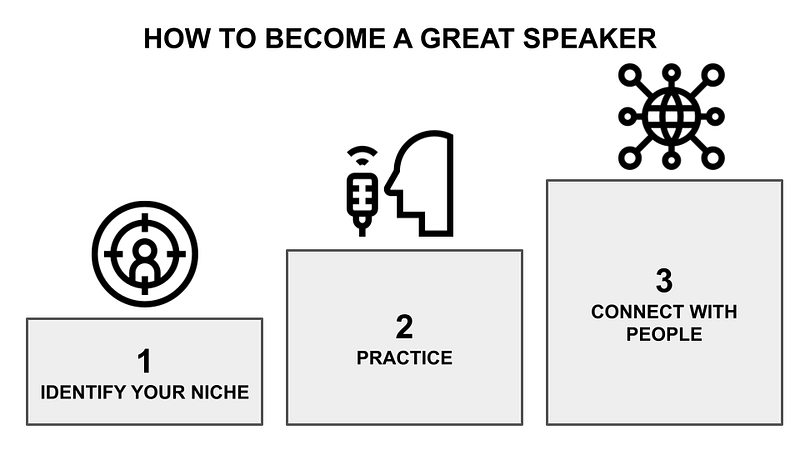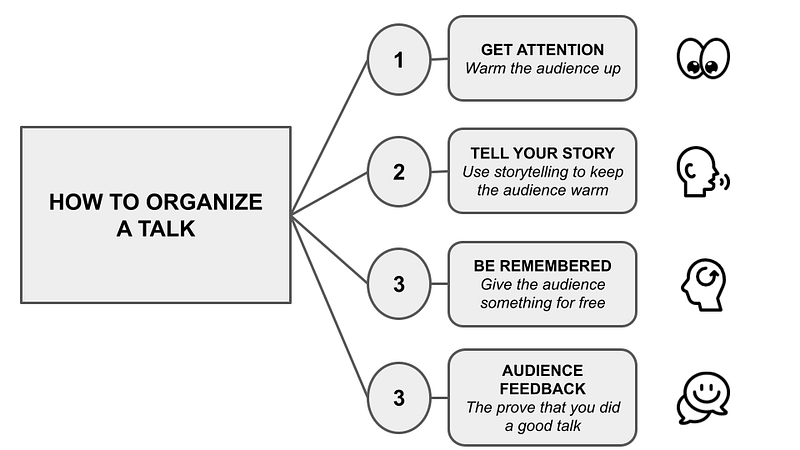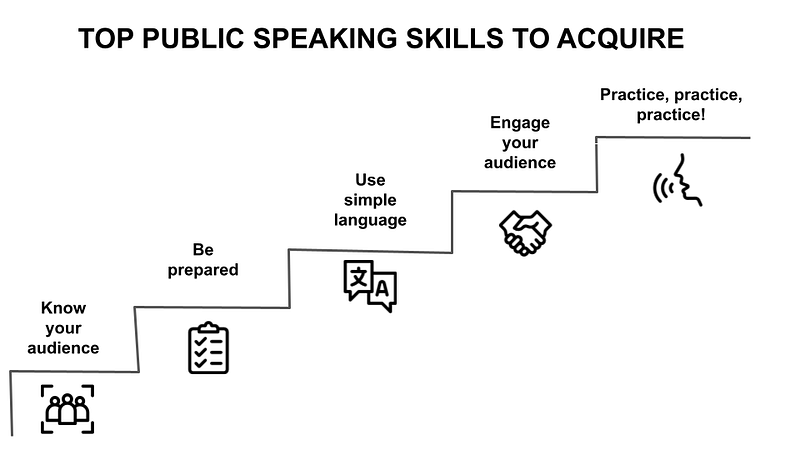Mastering Public Speaking: Key Skills for Data Science Professionals
Written on
Chapter 1: The Importance of Public Speaking in Data Science
In the evolving domain of data science, proficiency in public speaking has emerged as a vital skill for those aiming to thrive in this competitive field. Effectively articulating intricate data concepts is crucial for achieving success in data-driven roles.
If you're passionate about data and aspiring to advance your career, mastering public speaking can help you stand out. But how can you enhance this skill? Below, we present key insights into public speaking tailored for data scientists, ensuring you leave a lasting impression at your next conference.
This article draws inspiration from the podcast episode "The Essentials of Public Speaking for Career in Data Science" featuring Ben Taylor, Chief AI Strategist at DataRobot.
Section 1.1: Cultivating the Right Mindset
There are numerous avenues to engage with data science, but a fundamental aspect is advocating for AI, which involves persuading stakeholders of its necessity. As a data scientist, you possess the unique opportunity to promote the transformative power of artificial intelligence. This responsibility includes educating others about AI's potential benefits.
You can engage your audience through various platforms—be it through blog posts, presentations, or informal discussions. Regardless of the medium, your aim should be to share accurate information about AI while remaining open to differing viewpoints. Given that data science is still an emerging field, there’s much to learn and explore.
By actively participating in AI advocacy, you can influence the trajectory of this dynamic discipline, ensuring its positive application for society.
Section 1.2: Taking the First Steps
To excel as a public speaker, continual practice is essential. The more frequently you present, the more at ease you'll become. Additionally, thorough preparation is key—understand your topic inside and out, allowing you to focus on conveying your message rather than worrying about your next point. Confidence is also paramount; when you exude assurance, your audience is more likely to trust your expertise.
To refine your speaking abilities, consider these steps:
- Identify Your Niche: Determine your passions within data science. What topics excite you? Tailor your pitches to relevant conferences, keeping them concise.
- Practice Regularly: Familiarity with your material fosters engagement. Record your presentations for self-evaluation to pinpoint areas for improvement.
- Connect Authentically: Your enthusiasm and authenticity will resonate with your audience, making your insights memorable.

Audience feedback is invaluable; it serves as a benchmark for your effectiveness. Post-presentation discussions can provide insights into the audience's reactions, helping you refine your approach.
Chapter 2: Structuring an Impactful Talk
Transforming your presentation into a narrative is one of the most effective strategies for engagement. Focus on the following elements:
- Capturing Attention
- Ensuring Memorability
- Utilizing Audience Feedback
To illustrate the organization of a talk:

Getting Attention
The introduction of your talk is critical; it sets the tone and forms the audience's first impression. You have their undivided attention initially, but it can wane quickly if not engaged.
As Ben Taylor emphasizes, the key to grabbing your audience's interest lies in storytelling, humor, or surprising facts. A compelling narrative where the audience sees you as the hero can evoke emotional connections.
When crafting your introduction, keep these tips in mind:
- Be Concise: Avoid lengthy introductions; get to the point quickly.
- Project Confidence: Your demeanor should reflect assurance, even if you're nervous.
- Engage Immediately: Begin with an intriguing fact, joke, or question to draw in your listeners.
- Provide Context: Offer background information to ensure everyone is aligned.
- Preview the Content: Tease upcoming points to pique interest.
Being Remembered
You want your audience to recall your insights rather than your nervous habits. Here are some strategies to leave a lasting impression:
- Maintain Eye Contact: This fosters a connection with your audience.
- Use Positive Body Language: Keep your posture open and your gestures relaxed.
- Articulate Clearly: Speak at a moderate pace to enhance understanding.
- Smile Genuinely: This makes you approachable and relatable.
- Be Thoroughly Prepared: Knowledge of your content boosts your confidence.
Audience Feedback
Questions from the audience indicate engagement. If you're unsure about an answer, it's perfectly acceptable to invite others to share their thoughts or suggest discussing it afterward.
Chapter 3: Crafting a Compelling Proposal for Conferences
Start by speaking at local events to build your confidence before tackling larger conferences. Often, a talk proposal requires a brief video of a past presentation. If you lack such material, consider recording one and sharing it online.
According to Ben Taylor, creativity is essential in your proposal, which should include:
- A brief overview of your talk
- The main themes and topics
- Justification for its relevance to the conference
- Any supplementary materials (slides, demos, etc.)
Writing a persuasive proposal is vital for acceptance. Review the conference guidelines to ensure alignment with their objectives. If uncertain, reach out to organizers for clarification.
Choose engaging topics to captivate your audience, such as:
- The current landscape of data science
- The critical role of data science today
- Real-world applications and case studies
- Personal experiences in data science
Chapter 4: Essential Public Speaking Skills
Public speaking is among the most crucial skills for data science professionals. Effectively conveying your findings is vital, and honing this skill takes dedication. Consider the following tips to enhance your capabilities:
- Understand Your Audience: Tailor your message to their knowledge level.
- Prepare Thoroughly: This ensures you deliver a polished presentation.
- Simplify Language: Use clear terms to ensure comprehension.
- Engage Actively: Incorporate stories and humor to maintain interest.
- Practice Relentlessly: Consistent practice leads to improvement.

Summary
You've now grasped the fundamental aspects of public speaking relevant to a career in data science. This skill is essential as data scientists frequently present findings to diverse audiences. Clear and concise communication can significantly impact how your work is perceived. To propel your career forward, focus on refining your public speaking abilities.
The insights shared in this article stem from the podcast "The Essentials of Public Speaking for Career in Data Science" featuring Ben Taylor on DataTalks.Club.
You may also find interest in:
- How to Start a Career in Data Science
- Differentiating Between Data Science Manager and Expert
- Building an Effective Data Science Team
The first video titled "The Essentials of Public Speaking for Career in Data Science" features Ben Taylor discussing key strategies for successful communication in the data science domain.
The second video, "Public Speaking for Scientists," offers invaluable insights into effectively conveying scientific ideas and engaging audiences.